Wildfire season in Australia has brought human and environmental tragedy. It also has sent a warning to us all. “There’s a huge, really very important message for everybody in the world looking at these fires,” Matthew England, a professor of oceanography and climate at the University of New South Wales, explains in the final episode of Global GoalsCast’s Season Three. “This is a glimpse into our future. we only have to take warming levels of the planet to about three degrees Celsius, which we’re not far off… We’re a third of the way to that warming…(and) the summer we’ve just had will be basically a normal summer event.”
In fact, 2019 was the warmest driest year ever recorded in Australia, with temperatures 1.5 degrees Celsius above the average in the late twentieth century. Edie Lush and Claudia Romo Edelman speak with Australians to understand the impact of these fires. Catriona Wallace, the founder and director of Flamingo Ai, a machine learning company, describes the flaming hell that consumed both her family farm and the neighborhood around her family summer home. “It’s like driving through something from a Mad Max movie or through an apocalypse,” she reports. “It’s something quite terrifying and extraordinary to experience.” The frightening experience has prompted her to focus her skills in Artificial Intelligence on creating tools to prevent or alleviate fires. She notes, too, that with men in charge things aren’t going well in Australian climate policy. Australia is the world’s largest exporter of coal and had a major hand in derailing the 2019 climate talks in Madrid.
Wallace says a new approach is needed, to balance the influence of the coal industry with the needs of other Australians. Wallace, one of the first women to have a company listed in the Australian stock exchange, points out that women are skilled at this broader, multi-stakeholder approach.
Empowering women to steward the planet is the goal of Pollyanna Darling, founder of the Australian chapter of TreeSisters, a global organization that raises funds to reforest the tropics and encourages women to seek leadership roles in protecting trees, forests and the overall environment.
“We have a political environment that’s not particularly favorable to environmental protection and care of the earth, which, because a lot of our economy’s based on resource extraction,” Darling says of Australia.
“From a TreeSisters perspective, one of the things that we have made it our mission to do is to help human beings to remember who and what they really are. And a part of that is remembering that we ARE nature and that without a healthy, thriving earth, we actually have nothing.”
Claudia points out that the United Nations has put Sustainable Development Goal 13, climate action, at the top of the Global Agenda. All three of our guests say they hope, and even sense, that the wildfires will encourage stronger action to curb greenhouse gas emissions.
Actions you can take are proposed in this episode by Rob Galluzzo, from the Lion’s Share, a project co-founded by UNDP to encourage corporations to pay into a fund for conservation and environmental protection every time they use an image of an animal in their advertising. Mars Corp., the candy-maker, is a founding partner.
In addition, Pollyanna Darling urges everyone to plant trees in their community and support TreeSisters (treesisters.org) in its work restoring tropical forests.
Featured guests
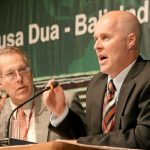
Professor Matthew England is Deputy Director of the UNSW Climate Change Research Centre. In 2014 Prof England was elected a Fellow of the Australian Academy of Science and in 2016 a Fellow of the American Geophysical Union. Prof England’s research explores global-scale ocean circulation and the influence it has on regional climate, large-scale physical oceanography, ocean modelling, and climate processes, with a particular focus on the Southern Hemisphere. Using ocean and coupled climate models in combination with observations, he studies how ocean currents affect climate and climate variability on time scales of seasons to centuries. His work has made significant impact on the treatment of water-mass physics in models, on the methodologies of assessment of ocean and climate models, on our understanding of large-scale Southern Hemisphere climate modes, and on the mechanisms for regional climate variability over Australia.

Based between the US and Australia, Dr Catriona Wallace is the Founder & Executive Director of Artificial Intelligence company Flamingo Ai, provider of Machine Learning technologies. Flamingo Ai is the second only woman led business ever to list on the Australian Stock Exchange. Catriona has been recognised as the Most Influential Woman in Business & Entrepreneurship (AFR) and as one of the country’s most eminent scientists by the Royal Institution of Australia. Catriona, an Adjunct Professor at the Australian Graduate School of Management, UNSW, is also a philanthropist, human rights activist and mother of five.
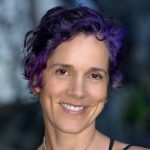
TreeSisters holds a piece of Pollyanna’s heart and she has been involved since it was a tiny seed. She volunteered for TreeSisters for 7 years before stepping into the core team. She is committed to playing her part in bringing our beautiful Earth back to thriving. Pollyanna has a project management, systems and entrepreneurial background, and also spent many years helping women live from their deepest wells of courage and have significant impact on the future of our planet.
Pollyanna is a mother of four boys, award-winning author, singer, passionate Earthlover, women’s empowerment facilitator, and loud laugher.
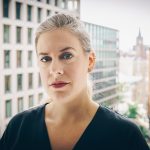
Swedish-born Dina graduated from the University of Oslo in Criminology and started her career as a Financial Advisor at the Norwegian bank DNB. But in 2012 she packed her bags and relocated to London in order to fulfil a long-held goal to work in the Music Industry. She first joined Warner Chappell as a Music Consultant before moving to Universal where she now works as a Key Account Manager with clients across the UK and Ireland. Dina is skilled in music supervision and provides music to an extensive network of clients among major broadcasters – such as the BBC and ITV – TV production companies and promo teams. But her role doesn’t stop there. She uses her creativity to come up with new album ideas, organise exciting events and find new ways to promote the production music industry.
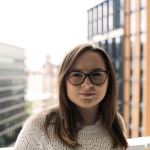
Áine Tennyson works as a Producer & Production Coordinator at Universal Production Music UK. Áine was recently at the helm of a rebrand for Focus Music, illustrating her creative flair and insight into the new look, feel and sound of the label. After gaining her BMus in 2016 from University of Glasgow in Composition & Sonic Arts, Áine started her career as an intern at Universal Music Publishing. Whilst gaining a certificate in Music Production: Mixing and Mastering at Goldsmiths University in 2017, Áine continues her talents as a composer. Áine is a classically trained singer with a background in Irish Traditional folk music.
Transcript
Catriona Wallace (00:02): It’s like driving through something from a mad max movie or through an apocalypse. It’s something quite terrifying and extraordinary to experience.
Matthew England (00:11): We’re going to be seeing events like this as a routine part of Australia in summer.
Pollyanna Darling (00:16): We have a political environment that’s not particularly favorable to environmental protection and care of the earth, which because a lot of our economy’s based on resource extraction.
Catriona Wallace (00:27): What role do we, the technologists play in really now turning our smart tech towards climate change. We’re seeing the finance sector very reluctant to take on big fossil fuel projects. They know that the writing’s on the wall
Pollyanna Darling (00:44): When people actually get their hands in the earth and they come together with one another and they’re doing something constructive that that really can build a sense of resilience and connection to nature that has the power to be transformative.
Claudia (01:07): Welcome to the Global GoalsCcast.
Edie (01:09): The podcast that explores how we can change the world.
Claudia (01:12): This episode, Edie, we go to Australia to hear from Australians the story of their catastrophic wildfires.
Edie (01:19): s the climate heats up. A leading Australian scientist explains why this will be the shape of things to come for us all. We will share the horror, the lessons, and the message of the Australian wildfires right after this,
Michelle Cooprider (01:37): This episode of global goals cast is brought to you by MasterCard. MasterCard is dedicated to building an inclusive world in which the digital economy works for everyone everywhere. Thanks also to CBS news, digital and universal production music.
Aina Tennyson (01:55): At universal music. We believe in diversity, so it’s definitely our responsibility to ensure that we develop opportunities for women to create music for a catalog.
Michelle Cooprider (02:05): And to Harman. The official sound of global goals cast.
Claudia (02:14): Welcome back. I’m Claudia Romo Edelman.
Edie (02:17): And Im Edie lush. Claudia, what a week. First of all, welcome back from Mexico. I am so glad that your mom’s okay.
Claudia (02:24): I know God that was horrendous. 21 days in intensive and intermediate care for a bad pneumonia, spending Christmas in the hospital, coming there like sleeping in the hospital bed, being totally concerned. Then now flying to New York to pack and then go to switzerland Edie! We’re going to Davos.
Edie (02:43): I know, Im excited to see you there next week. We’ve got a kickoff event on Monday together at hub culture celebrating the champions, achieving the global goals. I’m excited to talk about progress with you and we’ve got a panel together on Wednesday looking at the data around the sustainable development goals and impact.
Claudia (03:02): And this year is special for me edie because we’re bringing a US Hispanic delegation to Davos people that I’ve never been that represent tech and companies that should be heard by decision makers. So talking about Hispanics with other decision makers, talking about the sustainable development goals with decision makers and speaking of sustainable development goals. Edie. Today we’re discussing global goal number 13 and that is repeat after me climate actions. It is the secretary general of the United nations has put climate action at the top of the world’s to do list last year and this episode we will make clear why he did that.
Edie (03:44): Today, we’re going to take you inside a climate catastrophe, not something that may happen someday because of global warming, but something that happened and is still happening right now, at least in part because we are warming our planet,
Claudia (03:59): So let’s be very direct about this. These wildfires that have horrified the world are related to global warming. Let me repeat those wildfires that have horrified the world are related to global warming. 2019 was the hottest, driest year on record in Australia. Temperatures were 1.5 degrees Celsius above the average for the last decade of the 20th century.
Edie (04:24): That is so spooky because as you know, Claudia, 1.5 degrees is described by the UN as the upper limit of tolerable warming.
Matthew England (04:33): I think there’s a huge, really very important message for everybody in the world. Looking at these fires.
Edie (04:39): This is Matt England, a professor of oceanography and climate at the university of new South Wales.
Matthew England (04:45): This is a glimpse into our future. We only have to take warming levels of the planet to about three degrees Celsius, which we’re not far off. We’re only, we’re a third of the way to that warming. So once we take the world’s temperatures to three degrees Celsius above present day, the summer we’ve just had will be basically a normal summer event. And so we’re going to be seeing events like this as a routine part of Australian summer. If we take warming to this level, extreme heat summers will be even worse and it’s unimaginable to think what they would be like in terms of temperatures and heat waves and so on. So the lesson for me is this is a glimpse into our future. It’s a future that we can avoid by drastically reducing our emissions. I’m actually glad for the fact that these fires have got so much international focus because I think people need to look at these sorts of events and realize this is what’s in store for us more and more frequent as we keep warming the planet.
Edie (05:44): We’ll hear more from professor England later, but first we want to take you inside the experience of these fires inside the apocalypse. And I’m not the one who used the word apocalypse that description came from the owner of the farm where one of the first big fires started. Her name’s Catriona Wallace. Her family has owned both a farm and a seaside house South of Sydney for many, many years.
Catriona Wallace (06:13): My sister and I drove down and as we’re driving from Sydney for about 200 kilometers, we drove through bushland that is on the major highway that had been completely burned. It’s like driving through something from a mad max movie or through an apocalypse. It’s something quite terrifying and extraordinary to experience. It was black trees with a very strange colored leaves, which were maybe somewhere between a faun to a light red color leaves. And what we know that the gum trees do is when they are burnt and that they’re at a time of stress, the leaves change color from green to this light reddy color and then they drop their leaves onto the ground to insulate their roots. And then when we got to act community, and this is a place I’ve been going to for my whole life. So if 54 years, my grandfather had built this old beach house down just a hundred meters of the beach around 80 years ago. He was an old fisherman and it was a very special place. So my grandparents lived there. My mother had grew up as her beach house and holiday house and then, and I’ve been going there since since I was born, so very, very special memories. And as we drove towards the Rosedale turn off of the highway, we turned and both houses on either side of the street were completely demolished and they look like torn, crumpled, bent, corrugated iron with just nothing underneath. So the fires were so ferocious that they just burned everything and just left the corrugated iron crumpled tin. The smell is something very invasive. There’s smoke in the air, you couldn’t see more than maybe a hundred meters ahead of you because of the smoke. We then saw the fire had run right through our garden and our property. The greatest relief is that we saw that our house was still standing but within a completely black charcoaled, devastation. And I used the word apocalyptic because this exactly what it’s like. It’s like something nuclear has gone through and just burnt everything.
Claudia (08:40): Wow. That was moving. I could see it the way that she was describing it, so incredibly moving. Wow.
Edie (08:50): I know and I looked at her Facebook pictures and the fire comes right up to the edge of the house and it’s thanks to her neighbors who helped keep the fire from engulfing her house that she still has it. I mean it’s, it’s beyond.
Claudia (09:08): We asked professor England to say a bit more about how climate change contributed to the severity of these fires.
Matthew England (09:15): No single weather event really can be linked to climate change in the way that many people would like us to make that link, but we can definitely talk about stacking the odds of these events higher and there’s no doubt whatsoever the Fire increased global temperatures, increased temperatures over Australia and more extreme phases of these modes of variability. We are increasing the odds of these events. The way the climate system works is there is always this randomness. We have weather events come and go. We have heat waves and then cold fronts that change that weather. The Bush fires that we have had this year are linked to two main weather and climate events. One has been this absolutely profound drought, unprecedented over the last couple of years over eastern Australia. There was so much fuel before the fires came along that all it really took was some extreme heat wave conditions to come along during summer and that triggered these fires. Once you have so much fuel there, it’s really just a matter of the right thunderstorms coming along to ignite the fires via lightning strikes.
Catriona Wallace (10:23): We’re used to drought but nothing as extreme as this. So not only if the fires destroyed the feed for the cattle, but the cattle were starving in any way. So now that we’ve lost so much of our pasture, we have to ship feed in for the cattle.
Claudia (10:42): Here’s Catriona again, talking about the impact of the drought and fire on her farm. She’s also starkly conscious of the emotional and financial impact on the community.
Catriona Wallace (10:55): And the mental health practitioner who was there with us yesterday said it’s at least 12 months that you should watch for signs of trauma post these fires. And then similar to us without the economic impact of the fires on our farm, which we may have to sell the cattle, we may have to destroy the cattle, we may not be able to run as a business anymore. So tutored, I see down at Rosedale, the South coast at this time of year should be a thriving tourist destination. There were no tourists, there was absolutely no tourists, there was the military, there were the police, there were the fire rescue workers and there was the trades people who are trying to fix things. So the businesses in these locations will also have an enormously difficult time to survive.
Edie (11:41): Claudia, Cat is the kind of guest that we could have on Global GoalsCast on any number of subjects. She’s an entrepreneur in artificial intelligence. And before the fires she was telling me she go on stage to give a keynote speech and she described three major issues that she saw facing the world AI, which is her day job, nuclear war, which recently seemed ever closer as tensions grew between the U S and Iran and climate change, which was suddenly engulfing her.
Catriona Wallace (12:13): My world in the last couple of weeks has come together with these three major crises presenting themselves all at once. So for me what I’m thinking through is what role do we, the technologists play in really now turning our smart tech towards climate change because I viscerally experienced this, now it is here and it is destructive.
Claudia (12:41): Katrina’s personal experience has shifted her focus on how artificial intelligence should be used.
Catriona Wallace (12:47): Now that I’ve been on the ground and walked through the fire zone, which is absolutely like a war zone for me. I’m much more interested in active AI. So whether it’s drones or whether it’s other climate detecting mechanisms or something that can actually be very hands on in the field, able to be doing useful things in addition to the analytics and the subject matter expertise that I’m already familiar with.
Claudia (13:15): Look Edie, this episode is feeling a bit grim and I have to remind you, this is the global goalscast. And I know being realistic is one of our trademarks, but so is being optimistic. We offer solutions, we celebrate champions making a difference and we want progress. And, you’re not giving it to me.
Edie (13:34): I know. I was actually wondering how long it was going to take you to remind me of that. I had a little bet with myself, but never fear. I’ve got you. We know their solutions. Remember our episodes with John Sterman of MIT and his interactive model of the climate.
Claudia (13:51): Si senora. We actually do know what to do, right? We need to drastically cut our dependence on fossil fuels, coal, oil, gas, and we need to be vigilant about the climate changes that are too late to stop so that we mitigate the challenge of rising tides and extreme weather.
Edie (14:10): Exactly. And Australia, I’m afraid to say it gets failing grades on both counts. The government of Australia continues to promote coal and the coal industry gives money to both political parties and the government was very slow to respond to the threat of the fires. A threat I might add that was predicted 10 years ago by a government study.
Claudia (14:32): I love Katrina’s reaction when you ask her what we could do about this. I think it’s a great page for more gender equity.
Catriona Wallace (14:40): There’s a part of me that knows that predominantly it’s the men running the show at the moment. My great interest is how do we mobilize women who perhaps can come at a different way of thinking about emerging tech climate change rather than a kind of a one stakeholder lens. We’re often good at having multi-stakeholder lens. So it’s not that we would ignore business or the economic importance of the mining companies or the coal companies, but we also then can hold in our minds and our policies and our strategies, all of the other stakeholders that are in fact as important or more important than this one key influence groups. So whether that’s community, whether that’s wildlife, whether that’s housing, whether that’s other businesses, and start building a multi-stakeholder approach to recovery. And then also a multi-stakeholder approach to climate change.
Edie (15:38): Sometimes Claudia, we talk about the Herculean effort that it’s going to take for the world to shift to carbon neutrality. But I’ve been having a think with my gender equality hat on and I think we need to rephrase it. I think it’s going to take a hippolytic effort.
Claudia (15:54): What, what are you talking about?
Edie (15:56): Okay. Stay with me. Hippolyta was the Amazon queen. So in the film recently, she was wonder woman’s mother. Powerful, not afraid to go to war. What I mean is we need to reframe the argument and bring women into the solutions.
Claudia (16:12): Uh, you are, a weird nerd, but I think I love it. Wonder woman is good. And her mother too, you know Edie, I told you that story, right? That wonder woman wasn’t allowed to become a UN ambassador because of the story. Crazy isn’t it? Because she was stereotyping women having to be sort of like naked and that was not the stereotype that we wanted women, women could be whatever and they didn’t have to be curvy and all that. And he was the first time that UN employees denied a UN ambassador to become true? There you go.
Edie (16:46): Okay.
Claudia (16:47): So overall I’m sort of like buying to your hypothesis. I hope that you enjoyed that thought. Pollyanna Darling, the CEO of three sisters, Australia thinks along the same, very similar lines to you.
Pollyanna Darling (17:00): Women are some of the most impacted people by climate change, you can see that the way that the earth has been treated is very similar to the way that women have been treated under patriarchy. And women’s voices have been squashed for a very long time. And what we want to do is bring those voices forward because that will create more balance in the world. And if we have more balance in the world then we are not going to be in this situation that we are now where the earth has been plundered to the point that it’s becoming uninhabitable. We are a global network of women and men who are making it as normal to give back to nature as it currently is to take. And we do that in a couple of different ways. Firstly, through funding the reforestation of the global tropics. And the other thing that we do is support and encourage women into leadership in the local area around environmental issues and specifically trees and forests.
Pollyanna Darling (18:10): From a tree sisters perspective, one of the things that we have made it our mission to do is to help human beings to remember who and what they really are. And a part of that is remembering that we are nature and that without a healthy, thriving earth, we actually have nothing. So we depend on a healthy, thriving earth and there are people who think the environment is a sort of hobby or an interest or a silo of interest, but it’s actually is the thing that we all rely on for our life. So that reconnection and that remembering are really important to helping people find the motivation from a deep place within themselves to make change and advocate for change and restoring nature to thriving.
Claudia (19:10): We have made a point of speaking to Australians for this episode because part of their message to the world about climate is to put it bluntly, do not do what Australia has done and for that, again, professor Matthew England here,
Matthew England (19:27): I’m deeply embarrassed to be an Australian citizen right now. I’m of course not responsible for the government that’s been elected and I’m not responsible for the denial of some politicians about the threats posed by climate change, but I can’t believe that I’m living on a continent where we’re seeing some of the worst impacts of climate change play out. At the same time, we have many people trying to dismiss that link. We’ve got people trying to argue that the science of climate change is in some way shaky and so I can’t believe we’re here in the year 2020 some 50 years since the first alarm bells were rung about ongoing greenhouse gas emissions. It’s a bizarre world to me to be in and I look across to other nations that are actually taking this problem more seriously and I wish we were there.
Edie (20:15): So we are left with a vital question. Australia has a special role. The world’s largest exporter of coal and a crucial country in the Glasgow climate summit later this year, are the wildfire is starting to shift attitudes in Australia?
Catriona Wallace (20:31): We do notice that the rhetoric is starting to change a bit only in the last say, week or two weeks when the fires have been so critical, particularly after the disastrous new year’s Eve that the government is saying now. And even the prime minister, Scott Morrison is saying that he believes that climate change is one of many factors that have caused the fires and this climate emergency. In this country the miners, the coal producers, the, the big industry bodies are still so powerful. It’s really them who I think have great sway and influence over the government. But what’s happened in this time beyond anything I’ve ever experienced is the incredible public backlash to the prime minister himself to the emergency minister, to the government.
Claudia (21:16): And as we have heard before, most recently in our last episode with the financial times, Gillian Tett, the finance sector is starting to shift its focus. Matthew England,
Matthew England (21:28): We’re seeing them very reluctant to take on big fossil fuel projects. They know that the writing’s on the wall. We’re seeing coal mines that are being abandoned. We’re seeing banks moving away from financing that sector and once the money dries up to those sectors, once they lose their subsidies and lose the incredible handouts they’ve been given over the years from government and from the finance sector, we’re going to see a real change in the way we produce energy and those sectors that have been held back so far, the renewable sector in particular will surge.
Edie (22:02): You sound like an optimist at heart, is that right?
Matthew England (22:05): Oh, absolutely. I can’t wake up in the morning without a view that something’s going to go right because um, it’s fun to be a scientist.
Edie (22:12): And where do you see the glimmers of hope that change will come?
Matthew England (22:17): The numbers of people who get the science today compared to where we were in the 90s even or even the early two thousands. It’s really heartening to me to see the hate mail drying up to see the support for the science gathering momentum. I mean, I’ve got to say the recent school student marches and demonstrations have been absolutely life. You know, this has changed the conversation and I just think I’ve got so much admiration for the leaders of, I mean Greta Thunburg asking, you know, how dare you, how dare you do this to us, was absolutely breathtaking for me as a scientist. For me, that’s a, that’s a reason to be optimistic. You’re seeing the next generation so switched onto this topic.
Edie (23:03): We’ve heard about government and business, but Tree Sisters sees the importance of a more holistic hands on approach for everyone. Reconnecting with nature at the four.
Pollyanna Darling (23:15): I’ve thought about this a lot as you can probably imagine since the fire started here in September in Queensland about what is the response of tree sisters in this situation? What would be regenerative? What would be something that is based on creating a future for our children and our grandchildren and their grandchildren and so on that isn’t just a knee jerk reaction and that’s actually going to do things like build resilience, educate about the importance of trees, encourage people, to take that regenerative action together because that’s really, really important that we actually do things together. Giving money is fine and it’s great and it’s really needed, but I think when people actually get their hands in the earth and they come together with one another and they’re doing something constructive, that that really can build a sense of resilience and connection to nature that has the power to be transformative
Claudia (24:14): And later we will hear some actions from Pollyanna and tree sisters that you can take right now. Well, Edie, this has been incredible. First of all, what an incredible set of interviews right with Catriona. What an incredibly way of describing what Australians might be feeling and seeing. We’ve been talking about how much climate change is shifting, how much, you know, like we see young people getting involved, how we see Greta, how we see companies being more green and more conscious and so on. But at the end of the day, political wheel is the question and we need to make sure that we understand that none of the big changes that we need will come both from government. These are the decision makers that have to make that shift, that have to make that commitment that I have to feel out their promises. And so how are we going to make that happen? How many Greta’s do you need? How many Australian fires, wildfires? Do you need to make sure that the decision makers of the world are going to take action? Because that’s really the only thing that is going to make the shift.
Edie (25:22): I agree. And I think if you can break the link between conservatism and climate, I think we could see it happen. So there’s increasing evidence that being conservative doesn’t have to mean opposing climate action. Austria’s new conservative green coalition, I just heard the conservative prime minister say that controlling borders and taking action on climate are the two top priorities. There’s also a push in the United States to get Republicans to tackle climate change. I’m really interested in whether this will help give the Australian government a way to move.
Claudia (25:56): It’s time for the decade of action as a secretary general have said, but it all lies on the political wheel. At the end of the day, the budgets needed to take climate solutions are in the trillions of dollars and there is no company, no individual that can do it. Of course everything helps, but we need to get to that point in which all the parts are pushing, providing political pressures so that there is an international action on climate change.
Edie (26:27): I do think as we head into Davos, the other part that I’ve been seeing coming through that you and I have talked about as well is this whole idea around financing of fossil fuel industry and the risk that that brings. Really interesting to watch the fight in the United Kingdom around Barclays, there’s 11 pension and investment funds that are now filing a resolution, calling for Barclays to set clear targets to phase out services to energy companies that failed to align with the Paris climate goals. Now these funds manage more than 130 billion pounds worth of assets. So the vote is in May, the jury is out, but they, alongside Larry Fink’s letter, I think we’re seeing more of a push from the private sector too.
Claudia (27:14): Yeah, I love that. I mean like, it’s so fantastic that we’re having this episode coming right after with such a strong voices from Australia, but also coming right after Larry spanks letter. I mean, he is, he might be criticized that it’s only whatever percentage of his funding that he’s putting towards, you know, sustainability, but having such a strong bold messaging saying, I will only invest in companies that put sustainability and climate change forefront and these are the issues that are going to be durable in the longterm for longstanding investment. It’s massive, but we should not leave those things only to either governments or institutions. I love the story of, of Barclays as well, but individual actions, you know, like people have to understand how important it is that you, when you’re looking at, you know, politicians, you’re not only voting for what they say domestically you have to care about what Politicians are saying about climate change.
Edie (28:13): And I think you were talking about individual action. It’s not too far of a leap to take to talk about one of our previous champions. We’ve had news from the South pole, from our friend Robert Swan. What have you heard?
Claudia (28:26): Uh, one of our first episodes ever on the global goalscast was following Robert Swan and Barney Swan, 60 miles, 60 days, uh, 100. What was he dealing with that they were doing? 600 miles, 60 days through the crab assists where our friend Robert Swan actually failed last time to complete his journey because the changes of climate change have made in the ice on the Antartica that he has done before. So he gained back to the Antarctica, get to finish that journey, that 300 miles that he couldn’t do last time and he fell off and broke his hip in the last 40 miles. Barney, his son went down to finish his 40 miles. Robert Twan said that he is willing to go back to England to train because he wants to finish his journey and I quote him because I need to send a message that if I am making this effort being 64 years old, I’m finishing this. Everybody can make an effort for the planet.
Edie (29:29): I think the other thing that is useful to talk about is the whole issue around communication and the climate change, communication challenge. How do you motivate action with a message that you’re increasing the probability of something, even if that increases dangerous, it’s really hard to get your head around that risk, especially when we still see people including the media in Australia and elsewhere sowing doubt and this challenge we faced in this episode. There’s still a lot of evidence that talking about apocalypse demoralizes people and deters action. So how do we in the media or a scientist handle that?
Claudia (30:06): That’s absolutely right, Edie. There’s a climate change communication problem, so we would love to hear from our audience and get suggestions from you so that we can talk about it the next episodes. What would trigger your action and talking about actions Edie beyond saying good luck and well done to Robert Swan and Barney Swan for finishing that journey and sending again a message. Strong message. It is time for our facts and actions.
Edie (30:35): It is first up are facts to impress your mother in law around the dinner table.
Claudia (30:41): Fact number one, not that we have not said it enough, but here we goes. Climate change is real. Extreme events are becoming more common and more severe as we see it in Australia.
Edie (30:53): Fact number two, Justin from the world economic forum for the first time that they’ve done their survey of risks to come their 10 year outlook, the top five global risks that they see in terms of likelihood are all environmental.
Claudia (31:09): fact number three for all the talk last year, the level of carbon emissions still went up and it needs to be going down.
Edie (31:20): And now for our actions. First from our friend Rob Galluzzo, so he’s the founder of Lions Share, followed by Pollyanna Darling from the Tree Sisters.
Rob Galluzzo (31:31): Hi Claudia and Edie Rob Galluzzo here, from the Lions Share. The Lions Share is a new fund backed by the United Nations. It’s essentially a new system whereby brands can contribute to a fund every time they use an animal in their advertising. I live in Australia and I’ve just seen firsthand the devastation that’s unfolding before our eyes. Look, there’s three simple actions I guess that we need to take. The first is obviously there is a primary fundamental need to provide adequate aid to Aussies fighting for their lives and their properties. There are a lot of volunteer Bush firefighters and firees that really need most support. The second is to develop longterm solutions in new methods and technologies for fire resilience. And the third, I guess would be to support initiatives like the Lions Share. Hopefully there’ll be many more like it, but all around systemic change. If we can find, uh, opportunities for real systemic change in fighting climate change, but not just climate change, I guess the way the private sector, the United Nations and the conservation world can come together and really change the way we operate. I guess the last point would be be imaginative. Be compassionate and see what other systemic change we think we can put in place as people work better in harmony with the planet.
Edie (32:55): Two more from Pollyanna, and it won’t surprise you that she wants you to plant a tree!
Pollyanna Darling (32:59): Preferably a native tree that’s appropriate for where you are. That’s going to support the wildlife where you are. And the other is to grow your own forest through Tree Sisters. We’re planting in Madagascar and Nepal, Cameroon, India, Brazil, Kenya, West Papua and Mozambique and supporting some of the world’s poorest people and helping restore biodiversity and watersheds and so much more. And you can grow your own forest by going to our website tree sisters.org and everything you need to do is there. We’ve got a beautiful way for you to keep track of how many trees you’re planting through your funding and it’s a really wonderful way to give back to the planet that gives us absolutely everything.
Edie (33:45): Thanks to Rob and Pollyanna for those actions.
Speaker 3 (33:49): Edie, Edie before we go we are going to hear from Dina Liberg and Aina Tennyson from universal music, which are our new sponsor and music partners for this. And we love them because they are supporting gender diversity in the production music world through their 100% her initiative.
Dina Liberg (34:14): You hear production music every day, whatever you know it or not in film and TV programs, radio advertising and the podcasts. The main difference between production music and commercial music is that production music is pre-cleared. That means that we own both the master and publishing rights. So it’s easy to clear the music for usage. At universal production music, we have over half a million of tracks, which is recorded in top studios around the world, such as Abbott road, British Grove, Capital studios, et cetera. We have a lots of clients that used to compose music specially for the TV programs, which can be very time consuming and expensive. So with our catalog we give them an alternative with high quality of tracks and a lot of Verity, you can find anything from rock and roll music to big scores. Imagine in the old days where it was only one TV channel and only one radio channel that needed music. How many do we have today? A lot. And in all of those new programs, music is demanded more than ever. And then we also have the podcast and the video on demand industry, which also requires music. This means that the production music market is actually bigger than an ever been before,
Aina Tennyson (35:38): At universal music. We believe in diversity, so it’s definitely our responsibility to ensure that we develop opportunities for women to create music for our catalog. Gender imbalance can be seen as early as when studying music. So in music technology, music production, mastering engineering, which has always been historically overrepresented by males. I think the opportunity for women is actually quite big. So if your music is in our global catalog, you have the potential to receive royalties from all over the world. And just recently universal music UK, won their women in music award for diversity. So we’re definitely on track, but we are equally aware that there’s a lot more work to do.
Dina Liberg (36:28): In general, we have a good balance of women at all levels, including senior positions at universal production music. Actually, our CEO of the entire publishing company is a woman and half of the music supervision team in the UK are female.
Dina Liberg (36:44): In the end of last year we partnered with, she said so, which is a global network of women in the music industry with the support of the global known prophet, She is the Music, to recruit female composers to work with us and to educate them about production music. The objective was to encourage female composers, producers and artists to submit their work to universal production music.
Aina Tennyson (37:07): So we ran a month long competition, which consisted of a global call for female identifying composers and producers to be part of the launch viral 100% her album, which is to be released in March, 2020 for international women’s day. We had over 450 submissions and initially we were expecting much less. So the outcome has been absolutely fantastic. We had women from all over the world submit their tracks, including the UK, the USA, France, Spain, Sweden, Netherlands from Brazil, Russia, Asia. We’ve now finally selected the final 10 amazing women to be part of this 100%Her album, we’re just finalizing the masters, which by the way had been mixed and mastered by female engineers. And once that’s all complete, we will be preparing the album to be cut to vinyl, which is also very exciting. Hopefully this is just the beginning of how we can continue to support talented women from all over the world who are seeking a career in the production music industry.
Edie (38:21): What a fantastic project. We look forward to sharing some of the 100% Her music and our next season.
Claudia (38:30): Thank you for listening to season three of global goals cast. We will be back soon with season four, so please like and subscribe via iTunes or wherever you get your podcasts and follow us on social media at Global GoalsCast.
Edie (38:44): And give us five stars and see you next time. See you next season. No, see you next week.
Claudia (38:50): See you next week. See you next season. Bye bye. Thank you so much. Bye.
Speaker 1 (38:58): Global goals cast was hosted by Edie lush and Claudio Romo Edelman. We are editorial gurued by Mike Oreskes, editing and sound production by Simon James. Our operations director is Michelle Cooprider and our interns Tina Pastore and Brittany Segora. Music in this episode was courtesy of universal production music, one of the world’s leading production music companies, creating and licensing music for film, television, advertising, broadcast, and other media including podcasts, original music by Neil Hale, Angelica Garcia, Simon James, Katie Krohn, and Andrew Phillips. This episode is brought to you by Mastercard, creating scalable solutions for sustainable and inclusive economic growth. Thanks also to CBS news digital and Harman . The official sound of Global GoalsCast.
